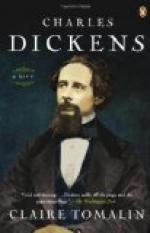one stories in reserve for home.” At Boston
the enthusiasm had swelled to even greater proportions.
“How can I give you,” he writes, “the
faintest notion of my reception here; of the crowds
that pour in and out the whole day; of the people
that line the streets when I go out; of the cheering
when I went to the theatre; of the copies of verses,
letters of congratulation, welcomes of all kinds, balls,
dinners, assemblies without end?... There is
to be a dinner in New York, ... to which I have had
an invitation with every known name in America appended
to it.... I have had deputations from the Far
West, who have come from more than two thousand miles’
distance; from the lakes, the rivers, the backwoods,
the log-houses, the cities, factories, villages, and
towns. Authorities from nearly all the states
have written to me. I have heard from the universities,
congress, senate, and bodies, public and private,
of every sort and kind.” All was indeed
going happy as a marriage bell. Did I not rightly
say that the world was conspiring to spoil this young
man of thirty, whose youth had certainly not been
passed in the splendour of opulence or power?
What wonder if in the dawn of his American experiences,
and of such a reception, everything assumed a roseate
hue? Is it matter for surprise if he found the
women “very beautiful,” the “general
breeding neither stiff nor forward,” “the
good nature universal”; if he expatiated, not
without a backward look at unprogressive Old England,
on the comparative comfort among the working classes,
and the absence of beggars in the streets? But,
alas, that rosy dawn ended, as rosy dawns sometimes
will, in sleet and mist and very dirty weather.
Before many weeks, before many days had flown, Dickens
was writing in a very different spirit. On the
24th of February, in the midst of a perfect ovation
of balls and dinners, he writes “with reluctance,
disappointment, and sorrow,” that “there
is no country on the face of the earth, where there
is less freedom of opinion on any subject in reference
to which there is a broad difference of opinion, than
in” the United States. On the 22nd of March
he writes again, to Macready, who seems to have remonstrated
with him on his growing discontent: “It
is of no use, I am disappointed. This is
not the republic I came to see; this is not the republic
of my imagination. I infinitely prefer a liberal
monarchy—even with its sickening accompaniment
of Court circulars—to such a government
as this. The more I think of its youth and strength,
the poorer and more trifling in a thousand aspects
it appears in my eyes. In everything of which
it has made a boast, excepting its education of the
people, and its care for poor children, it sinks immeasurably
below the level I had placed it upon, and England,
even England, bad and faulty as the old land is, and
miserable as millions of her people are, rises in the
comparison.... Freedom of opinion; where is it?
I see a press more mean and paltry and silly and disgraceful
than any country I ever knew.... In the respects
of not being left alone, and of being horribly disgusted
by tobacco chewing and tobacco spittle, I have suffered
considerably.”




